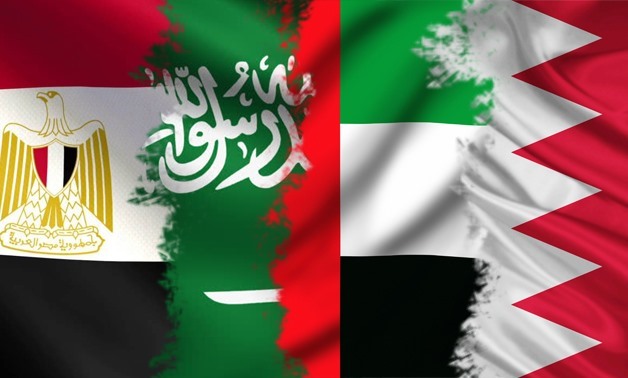
Flags of the Anti-Terrorism Quartet (ATQ) of Egypt, Saudi Arabia, the UAE and Bahrain – File photo
CAIRO – 12 September 2017: With nearly 100 days having passed with the tiny Gulf emirate of Qatar cut off by the four countries - Egypt, Saudi Arabia, the United Arab Emirates and Bahrain - experts warn that it could continue until 2018 and beyond.
"I expect this crisis to continue next year," Christopher Davidson, a Middle East expert at Durham University, told AFP.
"The boycott has huge losses, especially as Qatar prepares to receive the World Cup," said Christian Ulrichsen, a Gulf analyst at the Baker Institute for Public Policy at Rice University.
The current crisis between the Gulf countries could end up with the expulsion of Qatar or the freezing of its membership in the Gulf Cooperation Council in the coming period, said Ahmed Darraj, a professor of political science at Cairo University.
On June 5, the four countries (Egypt, the UAE, Saudi Arabia, and Bahrain) severed their ties with Qatar over its support to terrorist groups. They asked Doha to stop funding terrorists in the region and demanded that the 13 conditions be met in order for dialogue to begin. The Arab countries also closed off their aerospace and maritime territories for Qatari transportation.
 Saudi FM Adel al-Jubeir , UAE FM Abdullah bin Zayed al-Nahyan , Egyptian FM Sameh Shoukry and Bahraini FM Khalid bin Ahmed al-Khalifa in Cairo on July 5 -REUTERS
Saudi FM Adel al-Jubeir , UAE FM Abdullah bin Zayed al-Nahyan , Egyptian FM Sameh Shoukry and Bahraini FM Khalid bin Ahmed al-Khalifa in Cairo on July 5 -REUTERS
Qatar has portrayed itself as a victim of human rights abuses, to the bemusement of campaign groups critical of the emirate's treatment of foreign workers as it prepares to host the 2022 World Cup.
 Qatar World Cup 2022
Qatar World Cup 2022
The tiny emirate has previously announced that the Saudis will form the majority of the 1.3 million fans expected to arrive in Qatar to attend the World Cup, and the Saudis are currently banned from entering Qatar.
"The only way for Qatar to get out of the crisis is to agree to the original demands of the provinces," said Christopher Davidson, a Middle East expert at Durham University.
Kristian Ulrichsen, a Gulf analyst with the Baker Institute at the U.S.-based Rice University, said the standoff was not likely to end any time soon, and added, "The 2014 diplomatic spat [when Bahrain, the UAE and Saudi pulled their ambassadors from Doha] lasted for eight months and the current crisis far exceeds 2014 in magnitude, so it is likely to last a lot longer."
Ulrichsen added "The only way to Qatar is to agree to the demands of the boycotting nations," he said.
The crisis has also exposed the West's inability to resolve the conflict, despite the fact that all states involved are western allies and some host vital strategic assets including America's largest Middle East air base.
In August, U.S. President Donald Trump said a deal could be "worked out very quickly", but only days passed before a fresh row erupted between Riyadh and Doha.
Some nations appear to be benefitting from the conflict. Oman has seen a 2,000 percent trade increase with Qatar since June 5, according to official figures published in Muscat.
Earlier this month, a trilateral meeting was held between Qatar’s Minister of Economy and Commerce, Ahmed bin Jassim Al-Thani, Iran’s Information and Communications Technology Minister Mahmoud Vaezi, and Turkey’s Minister of Economy Nihat Zeybekci, in Tehran in order to discuss furthering their economic relations and possible trade routes between Turkey to Qatar passing through Iran, an Iranian newspaper reported.
Qatar's foreign minister said that goods and materials reach Qatar from sea ports and regional airspace that remain open, contradicting the claims of a blockade and the full briefing of sea, land and air.
 Qatari Foreign Minister Sheikh Mohammed bin Abdulrahman al-Thani - Reuters
Qatari Foreign Minister Sheikh Mohammed bin Abdulrahman al-Thani - Reuters
After several countries severed ties with Qatar, Tehran immediately provided assistance to Doha and provided it with food.
On June 12, Iranian Air spokesman Shahrokh Noushabadi promised to support Qatar with shipments of food. Days after the announcement, Iran sent four cargo planes full of food supplies, and they promised to send more.
On August 8, Iran’s ambassador to Qatar Mohamed Ali Sobhani stated, “There is no problem sending shipments by air or by sea to help Qatar.”



Comments
Leave a Comment